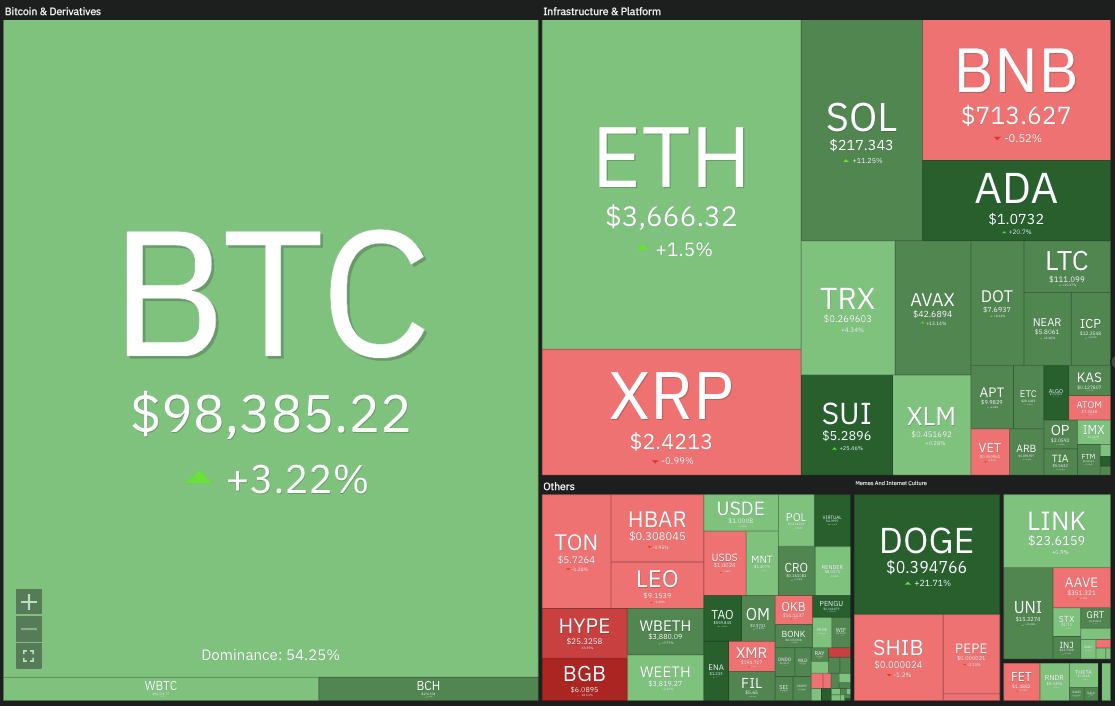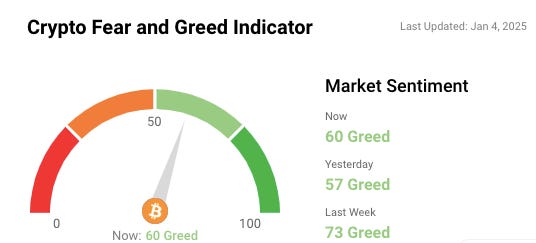📔 Weekly Journal: Spacial Computing Update
[6 min read] Your weekend guide to getting ahead on the digital frontier. Today, the usual market news as well as everything you need to know about the progress being made in Spacial Computing
Welcome to this week’s Weekly Journal 📔, your guide to the latest news & innovation in emerging technology, digital assets, and our exciting path to the Metaverse. This is week 109 of the 520 weeks of newsletters I have committed to, a decade of documenting our physical and digital lives converge.
New subscribers are encouraged to check out the history & purpose of this newsletter as well as the archive.
- Ryan
🌐 Digital Assets Market Update
To me, the Metaverse is the convergence of physical & virtual lives. As we work, play and socialise in virtual worlds, we need virtual currencies & assets. These have now reached mainstream finance as a defined asset class:
🔥🗺️ 7-day heatmap below, showing the current share of the market for the top cryptocurrencies, and their change in price over the last week.
🎭 Crypto Fear and Greed Index is based on volatility, social media sentiments, surveys, market momentum, and a few other bits and pieces.
🗞️ Interesting news from this week
Meta to Add Displays to Ray-Ban Smart Glasses: Meta plans to enhance its Ray-Ban smart glasses by incorporating displays capable of showing notifications and AI assistant responses. This development is part of Meta's strategy to lead the market in creating wearable devices that could potentially replace smartphones as primary computing devices. The updated glasses are expected to be released in the second half of 2025. Read more here: Financial Times
The Next Wave of AI Could Be Led by Nvidia and Pokémon Go: Companies like Nvidia and Niantic are pioneering geospatial AI models, a field known as spatial intelligence. Nvidia's Earth-2 project utilizes geospatial AI for climate predictions, while Niantic leverages its location-based technology to create 3D models of real-world locations, indicating significant advancements in spatial computing. Read more here: Barron's
Why the Metaverse is Moving into Physical Retail: Brands are increasingly integrating metaverse technologies into physical retail spaces to enhance consumer engagement. Initiatives include immersive tech-driven pop-ups, such as smart mirrors and 360-degree pods, enabling augmented reality product trials and interactive virtual environments, blending digital and real-world experiences. Read more here: Vogue Business
👓 Read of the Week: "The Evolution of Spatial Computing and the Metaverse: A Look into 2024"
This article explores the latest developments and predictions for spatial computing and the metaverse as of 2024. It delves into how these technologies are blending the digital and physical worlds to create immersive and interactive experiences, highlighting their potential impact across various industries. Read it here: The Metaverse Spectrum
🎥 Watch of the week: "Spatial Computing: Why the Future of the Internet is 3D"
This podcast episode from the World Economic Forum discusses the transition from a two-dimensional internet to a three-dimensional metaverse. Experts provide insights into the opportunities and challenges of spatial computing, emphasising its role in creating immersive digital experiences.
AI 🎨🤖🎵✍🏼
In the Metaverse, AI will be critical for creating intelligent virtual environments and avatars that can understand and respond to users with human-like cognition and natural interactions:
Generative AI: Transforming World-Building in the Metaverse
Generative AI is revolutionising the process of world-building in the metaverse by automating the creation of virtual assets, landscapes, and dynamic narratives. Traditionally, constructing immersive environments required extensive resources and time, often limiting creativity due to budgetary constraints. However, with tools like OpenAI's DALL-E and Epic Games' Unreal Engine, developers now have the ability to generate highly detailed and interactive virtual worlds in a fraction of the time.
Generative AI models can design realistic terrains, lifelike characters, and adaptive storylines that respond to user actions in real time. This technology enables even small indie creators to compete with larger studios, democratising access to metaverse development. Beyond gaming, applications extend to education, virtual training simulations, and collaborative workspaces, enhancing engagement and functionality.
Moreover, AI-driven world-building allows for personalised experiences, tailoring environments to individual user preferences and needs. The ability to continuously refine and adapt these spaces ensures they remain relevant and engaging over time, fostering deeper connections between users and the virtual worlds they inhabit.
As generative AI continues to evolve, its impact on metaverse development promises to push the boundaries of creativity and redefine how digital experiences are designed and consumed.
That’s all for the free version this week! If you have any organisations in mind that could benefit from learning about emerging technology, be sure to reach out. Educational workshops are one of many consulting services I offer.
DCA With Me 🤑
Dollar Cost Averaging is an investment strategy in which an investor regularly invests a fixed amount of money into a particular asset/asset class at regular intervals, regardless of its current market cycle. By doing so, the investor can reduce the impact of market volatility and potentially earn a better return over time. Motto = time IN the market beats trying to time the market
To experiment with this, I invest $50 NZD into a Digital Asset every week. Each week I will choose an asset that seems underpriced in the short term and has positive long-term potential. My timeframe is 3-5 years. I don’t give financial advice but if you want to follow along with me you can use my easycrypto.co.nz referral link to support this newsletter. Let’s dive into this week’s pick:
Keep reading with a 7-day free trial
Subscribe to Metaverse Field Guide to keep reading this post and get 7 days of free access to the full post archives.



